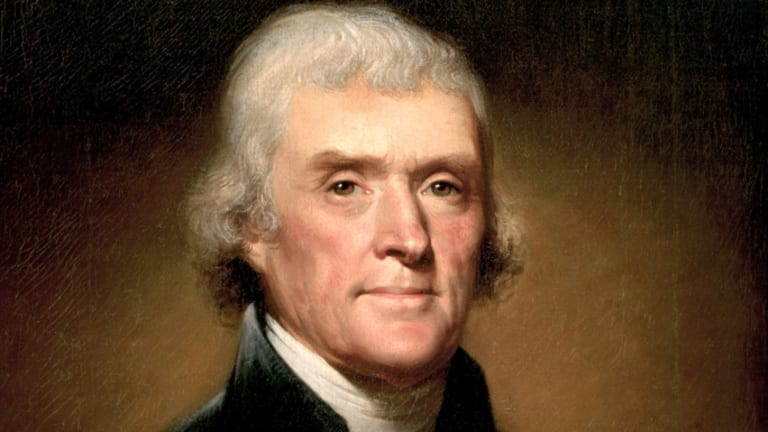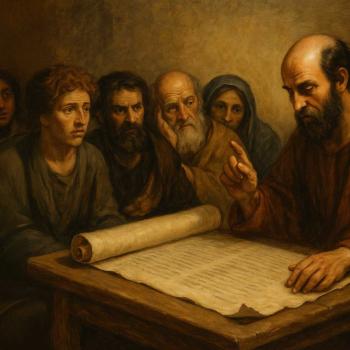 This year is the 200th anniversary of “The Jefferson Bible” as it is popularly called. But it really is entitled The Life and Morals of Jesus of Nazareth. It was compiled, thus not actually authored, by the third U.S. president, Thomas Jefferson, in 1820. Jefferson did something similar to what I did in compiling my first book, The Gospel (237 pp., softcover, but no longer in print). This book was published in about May of 1987. But I also made it a part of my two-part book, The Gospels Interwoven (415 pp., hardcover) published one month later and endorsed by my friend Evangelist Billy Graham.
This year is the 200th anniversary of “The Jefferson Bible” as it is popularly called. But it really is entitled The Life and Morals of Jesus of Nazareth. It was compiled, thus not actually authored, by the third U.S. president, Thomas Jefferson, in 1820. Jefferson did something similar to what I did in compiling my first book, The Gospel (237 pp., softcover, but no longer in print). This book was published in about May of 1987. But I also made it a part of my two-part book, The Gospels Interwoven (415 pp., hardcover) published one month later and endorsed by my friend Evangelist Billy Graham.
My book, The Gospel, is a single-narrative harmony of the four New Testament (NT) gospels in the New International Version of the Bible. Thus, I joined all four gospels together in one reading, leaving nothing out while deleting repetition since two or more of these gospels often report the same acts and sayings in Jesus’ ministry. You could say that Jefferson and I did the same thing in taking a Bible, cutting up its four gospels, and pasting portions together. But there is one huge difference between our compilations.
Thomas Jefferson had a high regard for Jesus except that Jefferson–a very learned man and widely read–was a typical rationalist and Deist of his time and therefore a product of Enlightenment. So, Jefferson did not believe Jesus did any of those miracles that are said of him in all four NT gospels, nor did he believe those gospels were right in narrating that Jesus literally arose from the dead. Thus, that’s where Jefferson’s scissors and paste came in even more handy that they did for me. That is, Thomas meticulously cut out all of that material in the gospels and tossed it in his trash can, but he pasted just about everything else into his Jefferson Bible.
John Adams was Vice President to our first president, George Washington, in 1789-1797, and then became our second president in 1797-1801. Thomas Jefferson was our third president, in 1801-1809. Jefferson compiled his Jefferson Bible in his old age. In 1814, Jefferson wrote to his friend, former President John Adams, who was a Unitarian who also had high regard for Jesus but did not believe in his miracles or resurrection. Jefferson wrote to Adams, saying of those portions in the four NT gospels, “It is as easy to separate those parts as to pick out diamonds from dunghill.” Now, I have a certain respect for Thomas Jefferson, but him using the metaphor “dunghill” to refer to Jesus’ alleged miracles and resurrection in the NT gospels makes me aghast.
I have written in books, “If Jesus did not arise from the dead, there never would have been any Christianity.” Actually, I have a subhead on “Deism” in my book, The Restitution of Jesus Christ (pp. 91-92, written with the pseudonym “Servetus the Evangelical”), that tells about Thomas Jefferson and his Jefferson Bible as follows:
Deism began in England in the mid-17th century. It spread throughout Europe and North America, flourishing there for about a century. Deism grew out of Enlightenment, partly in reaction to the religious intolerance of the Reformation. Deism consisted of an intellectual rationalism that was based solely on reason and natural law. Thus, Deism was anti-supernaturalistic, generally skeptical of divine revelation and therefore the Bible, and generally opposed to orthodox Christianity.
“Pure Deists believed in a personal, transcendent Supreme Being who created a “clockwork universe,” meaning that He did not afterwards intervene in human affairs. Moderate Deists, however, postulated that God was immanent in the individual human conscience, if not active in human affairs. Regarding theological dogma, all Deists were known most for rejecting the Christian doctrines of the incarnation and the Trinity. Some of them were a bit hazy on whether the one God was a personal being. They frequently employed the words “Providence,” “God of Nature,” or “the Deity” rather than “God.”
Deism remained an ideological movement that never formed into a particular school of thought or cultus. Actually, classical Deists were opposed to organized, institutional religion. Yet many of those who declared themselves as Deists were not without influence in society. Several founding forefathers of the USA were Deists. Thomas Jefferson (1743-1826), the author of the U.S. Declaration of Independence and the third U.S. president, was a thorough-going Deist. (Some authorities, however, claim that it is more accurate to classify him as “a Freethinker.”) Moderate Deists included George Washington (1732-1799), the first U.S. president, and Benjamin Franklin (1706-1790), the great inventor, publisher, politician, and Renaissance man.
Thomas Jefferson opposed much of organized Christian religion when he helped get “the establishment clause” into the First Amendment to the U.S. Constitution. It reads, “Congress shall make no law respecting an establishment of religion.” Jefferson was most opposed to Presbyterianism. In his writings, he frequently denounces John Calvin, calling him an “Atheist.” Jefferson later wrote the following harshly rhetorical attack on Presbyterianism, citing the Servetus episode:
The Presbyterian clergy are the loudest, the most intolerant of all sects; the most tyrannical and ambitious, ready at the word of the law-giver, if such a word could now be obtained, to put their torch to the pile, and to rekindle in this virgin hemisphere the flame in which their oracle, Calvin, consumed the poor Servetus, because he could not subscribe to the proposition of Calvin, that magistrates have a right to exterminate all heretics to the Calvinistic creed! They pant to re-establish by law that holy inquisition which they can now only infuse into public opinion.
Later, in Germany, Deism helped stir the emergence of both biblical criticism and the History of Religions School. In the U.S., Thomas Jefferson became one of the first biblical critics among American Deists when, in the winter of 1819-1820, he produced a composite harmony of the four NT gospels. Entitled The Life and Morals of Jesus of Nazareth, it was published posthumously, in 1904. It emphasizes the ethical teachings of Jesus. But as a purely rationalistic work, it excludes all gospel narrative that depicts Jesus as a healer and miracle-worker, and it excises his resurrection and post- resurrection appearances as well.












